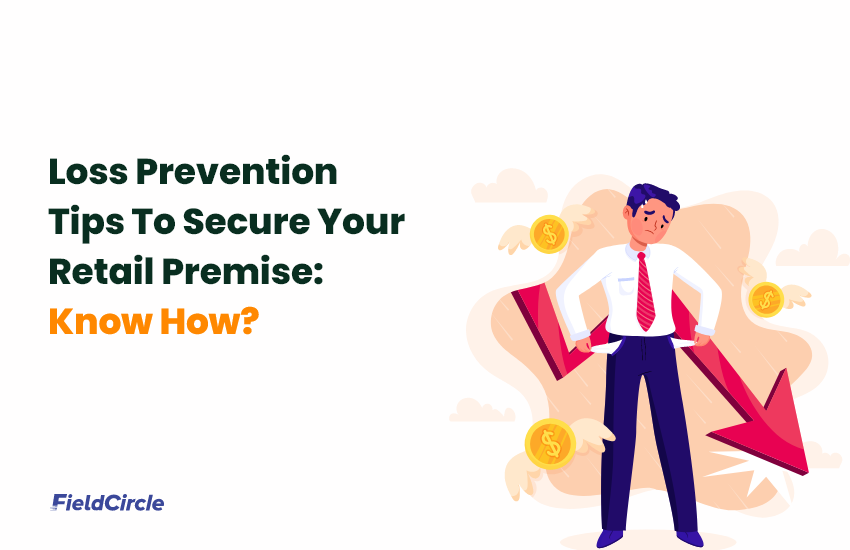Loss Prevention Tips to Secure Your Retail Premise: Know How?

Effectively managing the loss prevention strategies in a facility is undoubtedly daunting. Wouldn’t you agree? Preventing losses accounts for safeguarding your inventory while keeping your profits up and streamlining the process for your retail operation.
For every business, regardless of size, loss prevention involves implementing strategies and solutions to prevent theft, fraud, and other losses. These tactics are an umbrella term for all areas, including security devices and systems, inventory management, and asset protection. The ultimate goal of these strategies is to improve your customer’s experience, safeguard your operational costs, and reduce any losses.
Let us quote some facts: In 2021, the retailer fraternity in the United States incurred a sudden increase in retail losses. As per National Retail Security Survey the loss figures rose to $94.5 billion from $90.8 billion in 2020. This encouraged a sudden boost among 45% of retailers to increase their loss prevention budgets in the same year. These findings clearly explain that business owners know that theft, fraud, and unexplained inventory shrinkage can create a hole in their earnings.
Our comprehensive guide in the following part will outline various strategies retailers can use to prevent losses and boost their profits by implementing adequate security measures.
What are the Most Common Security Risks for a Retail Facility?
Retail facilities are susceptible to three prominent security risks that can significantly impact business operations. You must identify and address these threats to ensure the safety and success of your business. Here are some common security risks in retail facilities:
1. Theft and Shoplifting:
A perennial challenge common for all retail businesses is customer theft and shoplifting. When someone attempts to steal your merchandise, no matter casually or as part of an organized crime, it can result in financial losses, increased security expenses, and reduced profitability. Therefore, it’s essential to implement effective theft prevention measures to mitigate this risk.
2. Internal Sabotage:
No business can survive internal sabotage; hence, activities like internal security breaches, often due to employee dishonesty, can pose a substantial risk to your business. Your employees may also have a role in activities like theft, fraud, or the mishandling of funds. Such misconduct causes direct financial loss and undermines trust within the organization. Implementing robust employee screening and monitoring protocols is the best way to address this concern and achieve your facility management goals.
3. Organized Retail Crime:
Coordinated efforts by a single or a group of criminals to steal your retail merchandise on a larger scale can be called organized crime. Criminal operations like these can be highly sophisticated and are a formidable security challenge for retail business owners. These type of crimes results in substantial losses, compromised inventory management, and disruptions in your business operations.
Strategies for Effective Retail Facility Security
If you aim to protect assets, prevent losses, and ensure a safe environment for customers and employees, security strategies are crucial to your retail business. Below, we have listed some key strategies that will help you secure your retail facility:
· Risk Assessment:
Conduct a comprehensive risk assessment to identify vulnerabilities specific to your retail facility. The evaluation should consider location, store layout, previous security incidents, and external threats.
· Surveillance and Monitoring:
Invest in a robust surveillance system with high-quality cameras placed strategically throughout the store. Ensure that on-site personnel or remote monitoring services continuously monitor the surveillance system.
· Access Control:
You can install access control measures to allow access only to authorized persons. Use technology-based systems like card systems, security codes, or biometric access to allow entry to restricted areas and stockrooms. Try to secure even your back entrances as well!
· Burglar Alarms:
We know that burglar alarm systems trigger alerts during unauthorized access or break-ins. This tool can also be your aid in securing your establishment. These systems can deter criminals and provide a quick response from security personnel or law enforcement.
· Lighting and Visibility:
Proper lighting inside and outside the establishment is crucial. If your facility is appropriately lit, criminal activity can be restricted to enhance safety. Additionally, ensure that the passersby and surveillance cameras adequately monitor all windows and entrances.
· Employee Training:
Train employees on security protocols, such as preventing theft and responding to security incidents. Encourage them to be vigilant and report any suspicious activity.
· Inventory Management:
Implement inventory control measures to track merchandise accurately. This includes tagging high-value items, maintaining accurate records, and conducting regular inventory audits.
· Security Personnel:
Depending on the size and location of your store, consider hiring security personnel, such as uniformed guards or loss prevention officers, to deter theft and handle security-related issues.
· Emergency Response Plan:
Develop a comprehensive emergency response plan that outlines the actions to take in various security situations, including theft, fire, or medical emergencies. Ensure that all employees are trained on this plan.
· Electronic Article Surveillance (EAS):
You can utilize EAS systems on high-value or high-risk items with tools like security tags and alarms. This technology can detect shoplifting by triggering alarms at exit points for unbilled items.
· Cybersecurity:
Protect sensitive customer and financial data by implementing robust cybersecurity measures. Ensure secure payment processing and regularly update and patch point-of-sale systems to prevent data breaches.
· Collaboration with Law Enforcement:
Foster a working relationship with local law enforcement. This can lead to quicker emergency response times and facilitate criminal investigation investigations.
· Customer Education:
Inform customers about your security measures, such as surveillance cameras and security personnel, to deter potential wrongdoers. Make it clear that security is a priority.
· Regular Security Audits:
Conduct periodic security audits to assess your security measures’ effectiveness and identify improvement areas.
· Crisis Communication Plan:
Develop a crisis communication plan to inform employees, customers, and the public during a security incident. Clear and timely communication can minimize panic and confusion.
Impact of Security Breaches on Retail Businesses
Security breaches in retail facilities can have far-reaching implications, affecting various aspects of a retail business’s operations and overall success. It is vital to recognize and appreciate the profound impact that security breaches can have:
1. Financial Loss:
Security breaches, such as theft and fraud, can result in direct financial losses to your business, eventually impacting your revenue generation and profitability. Additionally, the costs of reinstalling the loss prevention measures will further strain your budget.
2. Damage to Reputation:
Frequent security incidents can tarnish your retail store’s reputation, leading to a loss of customer trust and a decline in foot traffic. A store perceived as unsafe is likely to lose potential customers, affecting long-term sustainability.
3. Increased Insurance Costs:
Ongoing security issues may increase insurance premiums, increasing a retailer’s operational expenses. These increased costs can affect the store’s bottom line and financial health.
4. Legal Consequences
Security breaches can lead to legal consequences, such as lawsuits from injured customers or regulatory fines for non-compliance. Legal battles can be costly and time-consuming, diverting resources from essential business activities.
5. Loss of Employee Trust
Employee dishonesty can erode organizational trust, affecting employee morale, teamwork, and overall productivity. This can further hinder a retailer’s ability to operate efficiently.
6. Disruption of Operations:
Addressing the aftermath of security breaches can disrupt day-to-day operations. Retailers must often allocate additional resources to investigate incidents, implement new security measures, and manage the associated fallout.
7. Inventory Management Issues:
Frequent theft and organized retail crime can lead to inaccuracies in inventory records. This can complicate supply chain management, affect stock availability, and result in customer dissatisfaction.
Security and Loss Prevention in Retail Facilities FAQ
· What is loss prevention in retail facilities?
Loss prevention in retail facilities refers to the practices and strategies implemented to minimize incidents of theft, fraud, and other security risks that can result in financial losses for a retail business. These measures protect the business assets, customers, and employees from potential harm and loss.
· How can retail loss prevention be effectively managed?
Retail loss prevention can be effectively managed by implementing various strategies such as maintaining adequate security measures, conducting regular employee training programs, utilizing security systems like surveillance cameras and alarms, monitoring inventory management processes, and partnering with local law enforcement agencies for support.
· What are the common causes of retail shrinkage?
Retail shrinkage, also known as inventory loss, can be caused by various factors such as shoplifting, employee theft, administrative errors, vendor fraud, damaged goods, pricing errors, or improper inventory management. Each of these factors contributes to financial losses for a retail business.
· How can I protect my retail business from theft and loss?
To protect your retail business from theft and loss, you can utilize a combination of security measures, including installing security cameras, implementing access control systems, conducting background checks on employees, training employees on theft prevention, maintaining proper inventory management practices, and establishing a solid relationship with local law enforcement agencies.
· What is the role of a loss prevention team in retail stores?
A loss prevention team in a retail store is responsible for proactively identifying and mitigating security risks and implementing loss prevention strategies. They monitor store operations, investigate incidents of theft or fraud, conduct training programs for employees, ensure compliance with security protocols, and collaborate with law enforcement agencies when necessary.
· Are industry associations focused on retail security and loss prevention?
Yes, there are industry associations that focus on retail security and loss prevention. One such association is the National Retail Federation (NRF), which provides retailers with resources, research, and support in addressing security challenges and implementing effective loss-prevention strategies.
· What are some practical loss prevention tips for retail businesses?
Some effective loss prevention tips for retail businesses include implementing a comprehensive security system, training employees on theft prevention, conducting regular inventory audits, establishing strong vendor negotiation and employee management practices, maintaining detailed records of transactions, and creating a culture of security awareness among staff and customers.
Conclusion
Managing loss prevention in a retail facility is a challenging task that cannot be ignored. Protecting your inventory and maintaining your profits are vital for the success of your retail business. Loss prevention encompasses many tactics and solutions to prevent theft, fraud, and other potential losses. These strategies include implementing advanced security devices and systems, accurate inventory management, and asset protection.
The primary objective of these strategies is to reduce losses and enhance the customer experience while also reducing operational costs and increasing profits. By prioritizing your customers’ and employees’ safety and satisfaction, you can safeguard your assets, fortify your retail facility against potential threats, and establish a strong foundation for continued success.
With these strategic steps, the right mindset, and assistance from FieldCircle, you can achieve a secured retail facility that will deliver optimum profitability.


